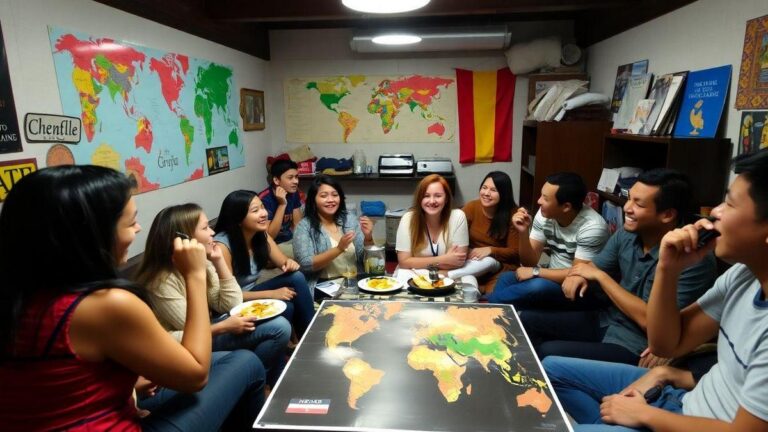Advanced language preparation tips for longterm global expatriates
Advanced language preparation tips for long-term global expatriates are key to blending in and thriving in a new country. In this article, you’ll discover strategies to enhance your language skills and overcome those pesky language barriers. We’ll explore how cultural immersion can boost your learning, share daily practices that keep you sharp, and show you how to utilize technology for great results. Get ready to improve your communication skills and connect better with those around you!
Key Highlights
- Start learning the local language early.
- Practice speaking with locals daily.
- Use language apps to make learning fun.
- Join conversation groups to boost confidence.
- Watch movies in the local language for better understanding.
Mastering Advanced Language Tips for Expatriates
Key Strategies for Effective Language Learning
When you’re living in a new country, picking up the local language can feel like climbing a mountain. But with the right strategies, you can make this journey smoother. Here are some key tips to help you learn effectively:
- Set Clear Goals: Decide what you want to achieve. Is it ordering food, having a chat, or making friends? Knowing your goals helps you focus.
- Practice Daily: Even if it’s just for 10 minutes, daily practice can make a big difference. Use apps, flashcards, or even a notebook.
- Speak with Locals: Don’t be shy! Engage with people around you. They can help you learn and correct your mistakes.
- Use Multimedia: Watch movies, listen to music, or tune into podcasts in the local language. This makes learning fun and engaging.
The Role of Cultural Immersion in Language Skills
Cultural immersion is like diving into a pool of language and culture. The more you surround yourself with the local vibe, the better your language skills will grow. Here’s how:
- Participate in Local Events: Join festivals, markets, or community gatherings. You’ll not only learn the language but also the culture.
- Make Friends with Locals: Building friendships can lead to deeper conversations and more practice.
- Explore the Cuisine: Cooking local dishes can introduce you to food-related vocabulary. Plus, it’s delicious!
| Activity | Language Benefit |
|---|---|
| Attending Festivals | Learn slang and cultural phrases |
| Cooking Classes | Vocabulary related to food |
| Local Tours | Practice conversational skills |
Tips for Overcoming Language Barriers Abroad
Language barriers can feel like walls, but there are ways to break them down. Here are some tips to help you communicate better:
- Use Gestures: Sometimes, actions speak louder than words. Use hand signals or facial expressions to help convey your message.
- Learn Key Phrases: Focus on essential phrases like greetings, directions, and common questions. This can ease conversations.
- Be Patient: It’s okay to make mistakes. Everyone learns at their own pace. Just keep trying!
Building Sustainable Language Skills for Long-term Expatriates
Daily Practices to Enhance Language Proficiency
To really boost your language skills, daily practice is key. Think of it like brushing your teeth; you wouldn’t skip it! Here are some simple things you can do every day:
- Read a little: Pick up a book, newspaper, or even a blog in your target language. Just a few minutes a day can make a big difference.
- Speak out loud: Talk to yourself in the language you’re learning. It might feel silly, but it helps you get comfortable with speaking.
- Listen actively: Tune into podcasts or music. Try to follow the lyrics or understand the story. This will help your ears get used to the sounds and rhythms.
- Write a journal: Spend a few minutes each day jotting down your thoughts. It’s a great way to practice writing and express yourself.
Utilizing Technology for Language Preparation
Technology can be your best friend when it comes to learning a new language. There are tons of apps and websites out there that can help you along the way. Here’s a quick rundown of some great tools:
| Tool | Purpose |
|---|---|
| Duolingo | Fun, game-like lessons |
| Babbel | Structured courses for beginners |
| Tandem | Language exchange with others |
| Memrise | Flashcards for vocabulary |
Using these tools can make your language learning feel less overwhelming and more enjoyable. Plus, you can practice whenever you have a few free minutes!
Resources for Continuous Language Learning
To keep your language skills sharp, you’ll want to tap into various resources. Here are some that can help you stay on track:
- Language Meetups: Join local groups where you can practice with others.
- Online Forums: Sites like Reddit or language-specific forums can be great for asking questions and sharing experiences.
- YouTube Channels: There are many channels dedicated to language learning. Find one that suits your style!
- Social Media: Follow accounts that post in your target language. It’s a fun way to learn new words and phrases.
By mixing these resources into your daily routine, you’ll be well on your way to mastering the language you’re learning.
Enhancing Expatriate Communication Skills
Importance of Non-verbal Communication in a New Culture
When you step into a new culture, non-verbal communication can speak volumes. Think about it: a smile can break the ice, while crossed arms might send a message of resistance. Body language, gestures, and facial expressions can vary widely from one culture to another.
For example, in some cultures, maintaining eye contact shows confidence and interest, while in others, it may be seen as disrespectful. Being aware of these differences can help you connect better with locals and other expats. So, keep an eye on how people communicate without words. It’s a powerful tool to enhance your interactions!
Networking with Other Expatriates for Language Support
Building a network with other expatriates can be a game-changer for your language skills. These individuals understand what you’re going through and can offer valuable support. You can share tips, practice speaking, and even learn from each other’s mistakes.
Consider joining expat groups on social media or local meet-ups. You never know when a casual chat over coffee might lead to a breakthrough in your language skills. Plus, it’s a fantastic way to make friends in your new home!
Joining Language Exchange Programs for Practice
Language exchange programs are a fantastic way to practice your speaking skills. These programs connect you with native speakers who want to learn your language. It’s a win-win situation!
Here’s how it works:
| Your Language | Their Language | What You Gain |
|---|---|---|
| English | Spanish | Speaking practice |
| French | Mandarin | Listening skills |
| German | Arabic | Cultural insights |
By participating in these exchanges, you’ll gain confidence and improve your fluency. Plus, you’ll learn about the culture from someone who lives it daily. It’s an enriching experience that can lead to lasting friendships.
Frequently Asked Questions
What are some advanced language preparation tips for long-term global expatriates?
Focus on daily practice. Use language apps, and watch local films. Join conversation groups.
How can I make language learning fun?
Play games! Use flashcards or try language challenges. Practice with friends for extra fun.
Should I hire a language tutor?
Yes! A tutor can give you personal feedback. You’ll learn faster with guided help.
How often should I practice speaking?
Every day! Even a few minutes counts. Find partners or talk to yourself in the target language.
Are there resources for learning slang and idioms?
Absolutely! Explore online forums or social media. Local podcasts and books can help too.

Hey, I’m Paula — traveler, language nerd, and the curious mind behind znewz.com. I’ve always believed that real connections happen through words, gestures, and shared experiences — not algorithms. That’s why I created this blog: to share travel stories from around the world and explore how language helps us connect in ways that AI still can’t. Whether I’m getting lost in a tiny town or striking up a chat in a language I barely know, I’m here to show that sometimes the best moments happen when tech takes a back seat.






